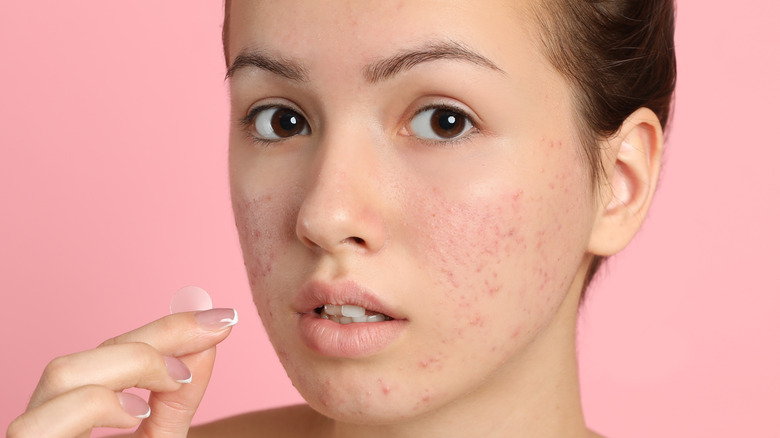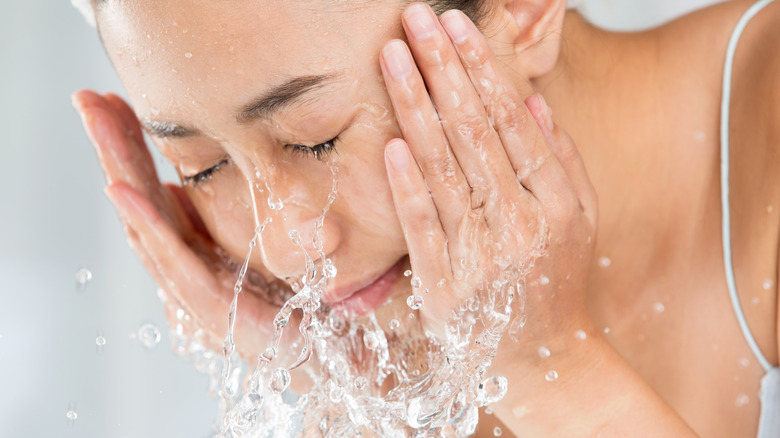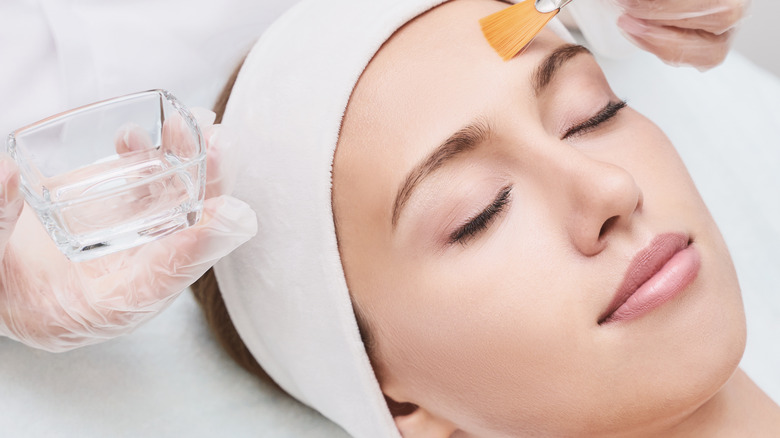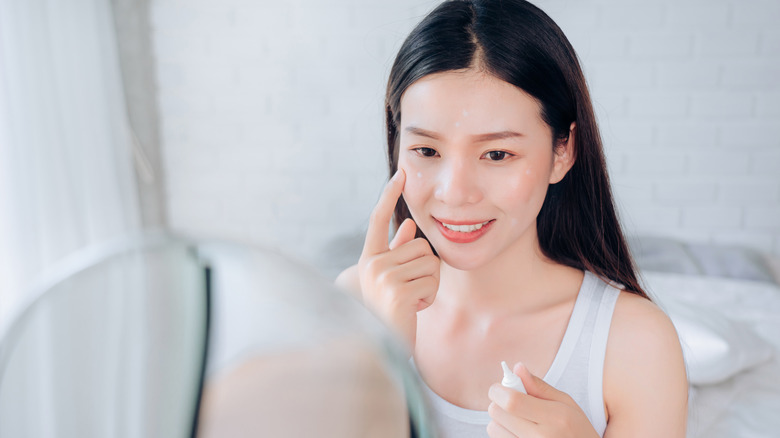Should You Get A Chemical Peel If You Have Rosacea?
According to the American Academy of Dermatology, over 14 million people in the U.S. have rosacea. This common skin condition is marked by red flushing to the skin, and affects primarily white women over age 30. Still, anyone can get rosacea, and it's definitely not pleasant, with the Mayo Clinic confirming that the blush-like appearance to one's skin is often accompanied by bumps that can be filled with pus and are sometimes mistaken for acne due to their appearance and the discomfort they cause.
Frustratingly, no cure for rosacea has been identified yet. As for what causes it, the AAD notes heredity can lead to some people developing rosacea, as can an immune system reaction. Doctors also know that certain triggers can lead to flare ups, but exactly what aggravates a person's rosacea is extremely individual. Many common triggers have been identified, including some things that sufferers won't be happy to hear are likely not good for their skin, such as sun exposure and alcohol, with red wine being specifically irritating when it comes to rosacea.
Other triggers that are common for rosacea sufferers are spicy food, exercise and cold weather. Oh, and hot weather. Sigh. The AAD stresses that certain makeup and skincare products and practices can further exacerbate rosacea symptoms. So would a chemical peel be advisable or not?
Picking the right skincare is key to manage rosacea
If you have rosacea, you already know how important it is to be extremely vigilant about how you care for your skin. The American Academy of Dermatology advises sufferers to test products before going full steam incorporating them into your skincare routine. A cleanser, toner or moisturizer — or any other skincare product — that contains irritating ingredients like alcohol or fragrance are definitely off the menu.
Meanwhile, exfoliating is not recommended for people who have rosacea, or even the use of a washcloth to clean the face, since scrubbing can irritate skin. So, since Healthline notes that a chemical peel is basically a very aggressive form of an exfoliating treatment, one has to wonder if this would be on the list of what a rosacea sufferer should avoid to keep flare ups at bay.
But first, before dismissing a chemical peel as an option altogether — because what if it could actually help? — let's look at exactly what the treatment consists of and its benefits.
Chemical peels may sound scary but offer many benefits
The word "chemical" in chemical peel may turn off some folks before they get any further in understanding what it is. And, the Cleveland Clinic notes that what the preparation does is, well, injure the top layers of the skin. But wait. Afterwards, those layers actually peel off to reveal younger, fresher-looking skin underneath — and who wouldn't want that result? If you have rosacea, it's not so far fetched to think that a chemical peel might help to reveal layers of the skin that wouldn't be affected by the condition.
Indeed, the Cleveland Clinic confirms that various skin conditions are effectively treated by applying a chemical peel, including some types of acne, mild scarring, dark patches and sun spots. Many people will use a chemical peel to treat fine lines and other signs of aging.
Meanwhile, per Marie Claire, there are plenty of chemical peels you can buy to use at home without so much as a trip to the salon, dermatologist or plastic surgeon, removing the barrier to entry for many of us. That said, if you have sensitive skin — and someone who has rosacea would definitely qualify — it may not be the best idea to try out a chemical peel without consulting your dermatologist — if at all.
Peels aren't prohibited for rosacea sufferers — but are they advised?
Chemical peels are not one-size-fits all skin solutions. According to Healthline, different strengths of chemical peels produce varying results. A superficial peel will employ alpha-hydroxy acid to peel off just the upper layers of the skin, while a deep peel utilizes a stronger acid such as tricholoracetic to reach the middle layer of the skin. A stronger peel would be done as an out-patient procedure at a doctor's office and requires sedation.
So, whether it's an over-the-counter product or a more aggressive treatment done by a plastic surgeon, is any chemical peel advisable if you have rosacea? Consider that treatment options for rosacea sufferers can be highly individual according to the Mayo Clinic. Topical medications often prescribed for rosacea do indeed contain an acid called azelaic acid to help combat the pimple-like blisters that accompany the condition. Other creams can help minimize the look of the flushing to the skin.
Paying attention to what you eat and drink is also recommended to help control flare ups, per Johns Hopkins Medicine. So, you'd want to steer clear of red wine, spicy fare and even caffeine. Oral antibiotics can also help, as can, wait for it, dermabrasion and glycolic acid peels.
Chemical peels alone won't cure rosacea
Arielle Kauvar, MD, clinical associate professor of dermatology at NYU School of Medicine confirmed to Oprah.com that a low-level chemical peel done with glycolic acid may actually help improve rosacea symptoms. A series of peels would be performed by a dermatologist and in combination with other treatments such as topical cream and oral antibiotics.
Medical aesthetician Spirithoula Koukoufikis confirmed to Yahoo! that with a professional to help rosacea sufferers pick the right acid balance, chemical peels can actually offer many benefits. Consider that some people will experience less redness, inflammation and pimples as a result of incorporating chemical peels into their overall rosacea management plan. (Remember, there's no cure for rosacea).
Meanwhile, don't think that this advice is your free pass to peel away. As Koukoufikis was sure to point out, successful treatment is all about the frequency: "By using acid peels too often, the skin is unable to heal and repair. In fact, it is highly likely that you will just create more inflammation and enhance the skin's sensitivity."
Be sure to peel with a professional
If you have rosacea and you are curious to see how a chemical peel may help you to manage your condition, the best thing to do is talk to your doctor. Taking into consideration all the advice out there from qualified medical professionals, it seems the last thing you want to do is try out chemical peel products at home only to end up irritating your skin even more.
The other main takeaway here is that a chemical peel alone is not going to make rosacea disappear. This treatment will be part of a comprehensive plan to manage the condition, in conjunction with dietary changes, topical and oral medications and incorporating the right skincare products — as well as avoiding triggers, from certain weather, to stress, to saunas (via WebMD).
In the end, the biggest lesson is that you needn't write off chemical peels if you have rosacea. Consult a professional to see if the treatment is right for you.





